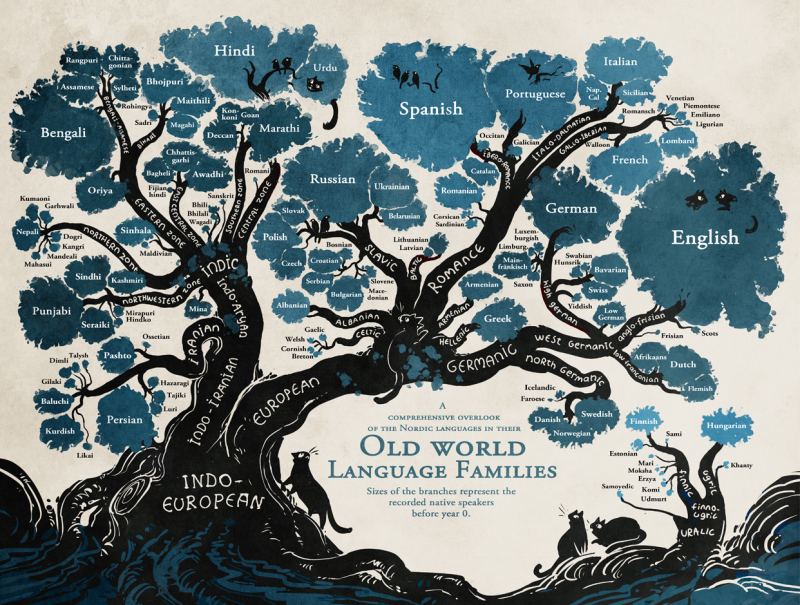
The illustration above is created by Minna Sundberg.
Unlike pictorial art, music is perceived and processed in time. Complex music — consisting of more than one melody woven together — is even more difficult to process than a single stream. It requires focused attention. It’s more akin to listening to several conversations at once even if they are speaking on the same topic. If attention strays for just a moment, vital data can be lost. Thus music comprehension improves over several listenings. Things like nuance in performance, which ride on top of the basic syntax and message, are easy to miss for novice listeners. Listening, like performing, requires the development of skills.
Humans are poor at splitting their attention and multitasking, and thus are prone to missing a lot of details.
Language is also much more than a ruled-based string of words. There is a melody to each that varies from language to language. The melody provides the underpinning of emotion to the informational content that words carry. It’s easy to create cognitive dissonance by using the wrong emotional music while delivering a message. People who are good at this are good at manipulation. This is because we listen to the music of words first and then to its content. Some people can’t listen to the words divorced from music — a reason that Stephen Hawking’s mechanical voice is so jarring. Saying “I love u” in that voice is strange to our ears. Babies listen to the linguistic melody their parents sing to them prior to understanding the words. Melody always comes first.
Other animals listen for the melodies, too. When we yell at our pets using baby voices, they don’t hear the content, just the delivery. The baby-voiced chiding sounds like a good thing, not an admonishment — it’s cognitive dissonance on display! Most humans listen to the melody of speech rather than the content of the message. Say the worst thing in a gentle voice and the person might not even pick up on the insult. That’s not that much different from a dog…
The music of words is paramount to comprehension. Even the way the word feels on our tongues when we pronounce it can change how we relate to it: does it buzz? (e.g. razor, zoom, zany) Does it make a pleasant shape in our oral cavity? (e.g. amore, malamute, poem) Does it feel like hacking? (e.g. Hank, Javier, Herman, Henry) Is it smooth? (e.g. Molly or Tommy) Oily? (e.g. Olivia or Mellisandra) Stochastic? (e.g. Tim, Ben, Joy) It matters. It matters so much that men with names that spike earn more in their lifetimes than men whose names are more smooth, that have a feminine sound to them! This has been dubbed the bouba-kiki effect (aka the maluma-takete effect).
“A growing body of research suggests that people tend to make a range of judgments based on nothing but the sound of a word or name.
At its most basic, this is known as the bouba-kiki effect, or maluma-takete effect, because of how our minds link certain sounds and shapes. Across (https://pubmed.ncbi.nlm.nih.gov/26379581/) many different languages (https://pubmed.ncbi.nlm.nih.gov/23121711/), people tend to associate the sounds b, m, l and o (as in the made-up words bouba and maluma) with round shapes. The sounds k, t, p and i, as in the nonsense words kiki and takete, are commonly seen as spiky. These associations may be partly rooted in the physical experience of saying and hearing sounds, with some feeling more effortful and abrupt than others.
Surprisingly, the bouba-kiki effect even extends into human relationships, and how we imagine the personalities of people we’ve never met.” — “What the sound of your name says about you” by Sophie Hardach, BBC
So names that are spiky like Kate, Kyle, Nick, and Chris are kid-sounding names and are perceived as having more energy. But names like Melinda and Oliver and Emily are softer-sounding — they make a different shape in the mouth as they are spoken. As that round softness affects how those names (or that word) are perceived and unconsciously characterized by our brains!
Of course, the shortness of the word or name matters as well. Another study found that shorter names resulted in higher earnings! And each additional letter in a first name reduced income. This is on top of the maluma-takete effect of the name stated above. So should parents take these studies to heart and name their children with super short, one-syllable names? I wouldn’t…we didn’t. Our children can blame their socio-economic outcomes on us now, I guess.
The sounds of language — both the actual sounds that are possible within a given language AND the musicality of the speech — have an impact on how we respond to the speaker on the emotional level. For example, it was hypothesized that because some languages trigger our smile muscles more often, the people who speak that language are overall happier! The main idea is that if smiling tricks the brain into feeling happy, then a language that makes you smile while speaking should do the same. So for example, the sounds “e” and “ah” force our faces into smiles. The opposite would also be true — languages that make us frown when we talk result in more depressed populations! Some languages are natural downers it would seem.
The music of language is elusive. Infants are primed to hear all human sounds that are possible to make. But by the time a child is several years old, their hearing starts to become selectively tuned to their own native tongue. The sounds that are distinctive in the first few months of life become almost impossible to hear by adults. That is why we try to teach languages early (or at least try to expose children to different languages so that they retain the ability to hear them as natives). Adults who learn to speak fluently a second (or third, or fourth) language retain their accents. Because even knowing the words is not enough to master the musicality of a foreign tongue. English is my second language and I’ve never lost my accent (although it is fainter now).
So this brings me back to writing my stories. So much of writing science fiction (or any fiction for that matter) focuses on communication or miscommunication between individuals, or cultures, or worlds, or species. And music is an important component of effective communication. It is easy to make the wrong first impression especially when that impression is made based on the deep emotional subconscious feedback of misperceiving the native musicality of others.
This month, I’m participating in another indie ebook giveaway: Out of This World Ebooks. I have two stories in this collection: Suddenly, Paris and Fresh Seed. The latter is a novella prequel to Harvest, a story of first contact between Earth and an older civilization. Suddenly, Paris is also a first contact story, but it is so much more complicated… So I hope you grab both stories. Enjoy! And pick a dozen more!

